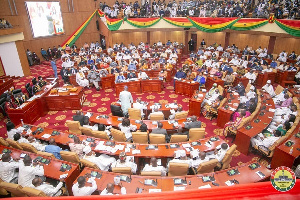- Home - News
- Polls
- Year In Review
- News Archive
- Crime & Punishment
- Politics
- Regional
- Editorial
- Health
- Ghanaians Abroad
- Tabloid
- Africa
- Religion
- Election 2020
- Coronavirus
- Photo Archives
- News Headlines
- Press Release
Editorial News of Monday, 18 January 2021
Source: goldstreetbusiness.com
Parliamentarians must put the people before their respective political parties
Ghana’s 8th Parliament has got off to the worst start possible; the shocking scenes of a Member of Parliament snatching ballot boxes during the election of the Speaker of the house, the subsequent physical melee and ultimately, the invasion of the legislative house by not just the police but an army unit as well put Ghana’s erstwhile model democracy (at least by Africa’s generally low standards) into global disrepute and outright shame.
To be sure, a hung Parliament was always expected to generate controversy right from the start, but even the biggest cynics could not have foreseen the sheer intensity of the inter-party squabbling that now runs through the legislature.
Hopes of a new era of co-operation between the two biggest political parties represented in Parliament was always wishful thinking, far removed from the reality of its track record of voting done strictly along party lines for virtually every issue except those relating to the state sponsored welfare of its members.
But now, with neither party having a clear majority, the inter-party divisiveness has become outright acrimony.
This acrimony will get worse not better. No matter who wins the several electoral protests currently being considered in various courts around the country – the biggest and most potentially divisive being the presidential election petition currently before the Supreme Court – there will be sore losers who feel politically strong enough to seek vengeance rather than pursue reconciliation thereafter.
Unprecedentedly intense acrimonious voting along political lines thereafter is the most likely ultimate outcome. It would also be a completely wrong one.
As the age old adage goes: when elephants fight it is the grass that suffers. A parliament whose legislative efforts are bogged down by partisan conflict – which prevents good potential legislation as well as bad – will have immeasurable adverse effects on the fortunes of the very Ghanaians who voted the MPs into office in the first place and whose tax payments pay their salaries and generous allowances.
This newspaper therefore appeals to the MPs to remember that their primary obligations are to their constituents and not to their respective parties. We accompany our appeal with a warning: the level of electoral attrition at last December’s Parliamentary polls suggests that the electorate will no longer quietly countenance self serving – or party serving – behavior in Parliament. The most vivid evidence of this is the electoral victory of an independent MP and the implications have been magnified by the importance of his victory to the relative strength of each of the two major parties in Parliament.
Thus, the current most unusual circumstance presents an unprecedented opportunity – not for the two parties to work together which is most unlikely – but for each MP to vote according to the needs of his or her constituents rather than those of the respective parties they represent.
This is how legislatures are supposed to work worldwide. Now it is time for Ghana’s Parliament to belatedly do so too.
Entertainment










